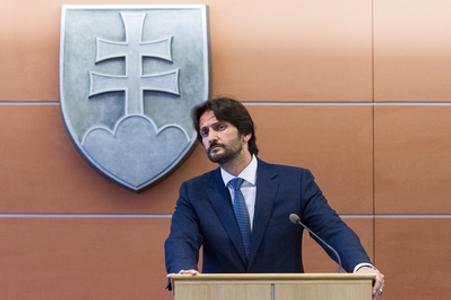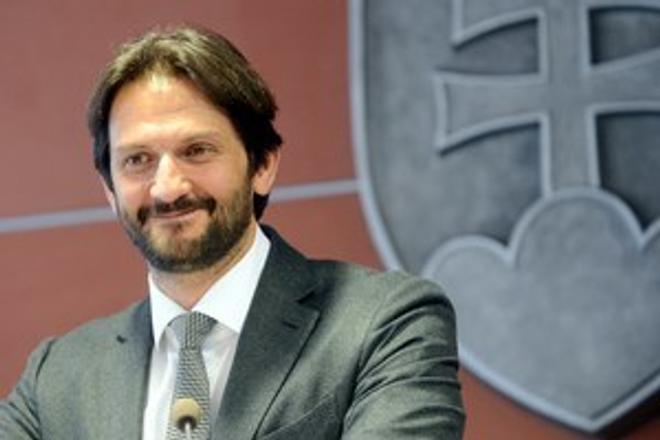Latvian Health Minister Guntis Belevics resigned on June 10 after he had jumped the line to get minor surgery. Poland’s transport minister resigned in November 2013 after prosecutors said he may have broken the law by failing to declare his ownership of a $6,600 wristwatch.
Slovak Interior Minister Robert Kaliňák in 2013 accepted suspicious €260,000 payment from businessman Ladislav Bašternák who was in the same year prosecuted for alleged tax evasion worth millions without informing public. During that time the opposition blamed police, Kaliňák’s subordinates, for poor investigation of the case. Kaliňák is now refusing to resign and coalition parties back his decision.
“If current Interior Minister Robert Kaliňák manages to survive this cause he would survive even a murder in live broadcast,” said Marián Leško, an anti-corruption activist and columnist of the Trend weekly, as quoted by the Sme daily.
The scandal however is not followed by as strong public response as some other causes were in past.
Around 3,000 people gathered in front of Prime Minister Robert Fico’s apartment in the Bonaparte residential complex in Bratislava on the evening of June 20 to protest against links between government and Bašternák. Fico responded that Smer is able to gather 5000 people anytime.
Moreover, a recent Focus polling agency survey showed that Smer lost 2 percent of voters which could only be a statistical error.
“The support for key Smer representatives is stable,” Political analyst Aneta Világi told The Slovak Spectator. “Until more clear and more easily understandable connection between negative role of Robert Kaliňák and this cause emerges the voting base of Smer will remain unshaken.”

Too small fall
Had a general election been held in mid-June, the governing-coalition Smer party would have won on 26.4 percent gaining 46 seats in the 150-seat parliament. To compare, in March 2016 elections it received 28.3 percent and won 49 seats.
The poll, which was carried out by Focus agency on a sample of 1,003 respondents between June 14-20, indicates that the Slovak National Party (SNS) would have come second, obtaining 14.5 percent. Freedom and Solidarity (SaS) would have come third on 14.1 percent. Next came OĽaNO-NOVA on 9.9 percent, Kotleba-People’s Party Our Slovakia on 8.4 percent, We Are Family-Boris Kollár on 6.9 percent and Most-Híd on 5.9 percent. Other parties would not make it to the parliament including coalition party Sieť.
“The Bašternák cause was reflected in Smer preferences only at level of statistical error,” Martin Slosiarik of Focus told The Slovak Spectator. “It cannot be said that this scandal caused a significant decline for Smer.”
Despite opposition claims that it is ready to organise protests until Kaliňák leaves such events will not reach their goal and will gradually weaken, according to Világi.
“The last more dominant protest was Gorilla protests and we know well what their reach was,” Világi said, as quoted by Sme. “The case has not been solved yet.”
The coming summer and holiday season do not play in the cards of the organisers of the anti-Kaliňák protests, according to Világi.

New facts
Meanwhile media reported about new facts related to the scandal.
The case was reopened after assistant of opposition MP Jozef Rajtár of Freedom and Solidarity (SaS), Filip Rybanič, took documents from the Tatra Banka bank which show that €260,000 arrived to Kaliňák’s account from the B.A. Haus company, a firm operated by tycoon Ladislav Bašternák until October 2013. Similar payments arrived also to account of former transport minister Ján Počiatek who left politics in mid April.
The money coming from B.A. Haus to Kaliňák’s account was marked as payments towards the loan. Opposition parties allege it was cover for a bribe from Bašternák for not investigating the tax case.
Kaliňák explained that money differently. He claims that Bašternák, when he was shareholder in the firm, lent money to the B.A. Haus. When Bašternák sold his share to Kaliňák and former Transport Minister Ján Počiatek they also took on the debt. Therefore B.A. Haus owed money to Kaliňák and Počiatek. Payments towards the loan amounting €260,000 which Kaliňák received from B.A. Haus covered this debt.
Denník N daily reported that Kaliňák bought from Bašternák a 16-percent share in the firm for €430,000 but the real value of the property was €1.04 million, according to The National Association of Real Estate Offices of Slovakia (NARKS).
“Serving Interior Minister thus took €610,000 bribe from Bašternák who had problems with police,” opposition OĽaNO-NOVA chairman Igor Matovič.
The interior minister also refuses to answer a question whether he attended Bašternák’s wedding in January 2012. His spokesman Ivan Netík responded that Kaliňák had already claimed he had not seen Bašternák for at least four years.
Fico stays quiet
During June 16 political debate of public broadcaster RTVS Fico said that Rybanič did not take a look only on Kaliňák’s account but he saw “significantly more”. After being asked about the source of this information he responded that he has received the information from Tatra Banka, which has denied Fico's claim.
“A bank employee cannot inform the prime minister about what his or her colleague saw without breaking the non-disclosure agreement,” Matej Kačaljak of the Department of Financial Law within Comenius University in Bratislava told The Slovak Spectator.
Other possible sources thus remain the Slovak Information Service, police, the National Criminal Agency (NAKA), or bank employees, according to lawyers approached by the Sme daily.
“Prosecution bodies should be independent and should not exchange information with politicians,” Világi said. “This case shows that this is upside down in Slovakia.”
Arguing with Penta
During the press conference Kaliňák said that the financial group Penta is concerned about his plan to publish the results of the investigation of the Gorilla case and now the media from its portfolio inform about his scandals in order to make him to stop.
“I publicly stated before the elections that regardless of how the investigation of the Gorilla case turns out, we will provide the information about police findings to the public,” Kaliňák told the press. “Since then the media under the influence of Penta have been conspiring, fabricating stories, and publishing lies.”
The Gorilla file is a lengthy document that purports to describe an operation conducted by the Slovak Information Service (SIS), the country’s main intelligence agency, in which it collected information about the influence of the Penta financial group on senior Slovak politicians between 2005 and 2006. The wiretapping took place between November 2010 and January 2011.
Kaliňák’s arguments, however, lack grounds, according to Sme. The Interior Minister does not have power by law to decide whether the police will publish the results of the inquiry into a specific case.
Such claims are nonsense, according to journalist Zuzana Petková of Trend, who has been reporting on the case. (Trend published by Penta’s News & Media Holding.) She added that Penta has no reason to go against Kaliňák.
“I don’t think that investigation of the Gorilla cause has progressed significantly during his management,” Petková told Sme.
Penta Investment Group is the financial partner of NAMAV company, which is 45-percent shareholder of Petit Press, the co-owner of The Slovak Spectator.



 Interior Minister Robert Kaliňák (source: TASR)
Interior Minister Robert Kaliňák (source: TASR)